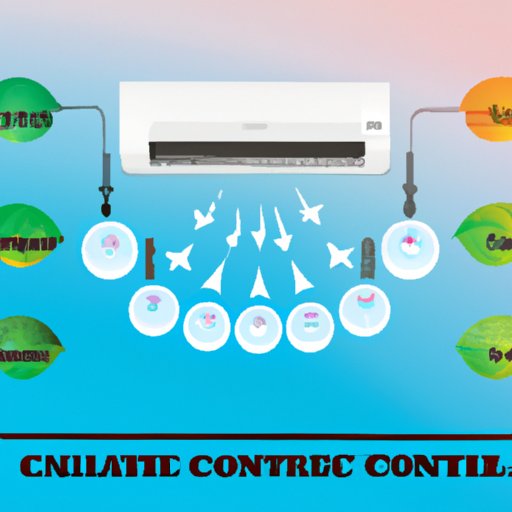Introduction
Air conditioning is a process used to cool indoor spaces using refrigerants and other components. It is used in both residential and commercial settings, and there are various types of air conditioners available to meet different cooling needs. This article will provide an overview of the components and processes of air conditioners, discuss the different types of air conditioners that exist, explain the cooling cycle of an air conditioner, provide tips for maintaining and troubleshooting your air conditioner, discuss the cost of operating an air conditioner, and outline the benefits and drawbacks of using an air conditioner.

Different Types of Air Conditioners
There are three main types of air conditioners: central air conditioners, room air conditioners, and portable air conditioners. Central air conditioners are typically used in larger spaces such as homes or office buildings. They consist of two units: an indoor unit that contains the evaporator coil and blower fan, and an outdoor unit that houses the condenser coil, compressor, and expansion valve. Room air conditioners are designed to cool individual rooms, and are usually installed in windows or through walls. Portable air conditioners are smaller, self-contained units that can be moved from one room to another. These are ideal for spaces where permanent installation is not possible.
The Cooling Cycle of an Air Conditioner
The cooling cycle of an air conditioner is based on the principles of thermodynamics. The cycle begins with the refrigerant flowing through the system and absorbing heat from the indoor air. The refrigerant then passes through the compressor, which increases the pressure and temperature of the refrigerant. Next, the refrigerant moves through the condenser coils, where the heat is released and the refrigerant is cooled. The refrigerant then passes through the expansion valve, which reduces its pressure and temperature. Finally, the refrigerant flows through the evaporator coils, where it absorbs heat from the indoor air and the cycle begins again.

Maintaining and Troubleshooting Your Air Conditioner
Regular maintenance and troubleshooting of your air conditioner are essential for optimal performance. Cleaning and replacing filters regularly can help keep your air conditioner running efficiently and prevent dust and dirt buildup. Checking electrical connections can help ensure that all components are properly wired and functioning. Checking refrigerant levels can help identify any leaks in the system. Lastly, inspecting ductwork can help detect any air leaks that may be causing inefficient cooling.

Cost of Operating an Air Conditioner
The cost of operating an air conditioner depends on several factors, including energy efficiency ratings, seasonal performance variations, and operating costs. Energy efficiency ratings indicate the amount of energy required to cool a given space, while seasonal performance variations refer to the difference in cooling capacity between summer and winter months. Operating costs refer to the amount of money spent on electricity to run the air conditioner. Generally speaking, more efficient air conditioners cost less to operate.
Benefits and Drawbacks of Using an Air Conditioner
Using an air conditioner can provide many benefits, including increased comfort and improved health. According to a study by the American Society of Heating, Refrigerating and Air-Conditioning Engineers (ASHRAE), air conditioning can reduce humidity levels, making indoor environments more comfortable. It can also help reduce airborne allergens and contaminants, providing relief for those suffering from allergies and asthma. Additionally, using an energy-efficient air conditioner can save money on energy bills and help reduce environmental impact.
Although air conditioners can provide many benefits, they also have some drawbacks. For example, if not maintained properly, air conditioners can leak refrigerant and cause damage to the environment. Furthermore, air conditioners can be expensive to purchase and install, and if not sized correctly, they can result in higher energy bills and inefficient cooling.
Conclusion
In conclusion, air conditioners are an important tool for keeping indoor spaces comfortable and healthy. Understanding the components and processes of an air conditioner can help you choose the right type for your needs, maintain it properly, and troubleshoot any issues. Additionally, knowing the cost of operating an air conditioner can help you save money and make informed decisions about energy efficiency. While air conditioners can provide many benefits, it is important to consider the potential drawbacks before making a purchasing decision.
(Note: Is this article not meeting your expectations? Do you have knowledge or insights to share? Unlock new opportunities and expand your reach by joining our authors team. Click Registration to join us and share your expertise with our readers.)
